This week was less about flashy demos and more about market positioning.
Quick map:
• Code – Apple+Anthropic, Gemini 2.5, OpenAI → Windsurf, Kevin-32B, Parakeet 2
• Cash – OpenAI’s PBC pivot, Fidji Simo hire, shrinking Microsoft tie-in
• Campus – Free credits from Cursor & Anthropic
1. The Coding Wars Heat Up
Apple × Anthropic – Bloomberg reports that Apple is teaming up with Anthropic to launch its own “vibe-coding” platform – i.e. Xcode powered by Sonnet. As a history refresher, Apple had demoed its own AI-powered platform for Xcode called Swift Assist during WWDC24, but it never actually shipped to developers (lots of disgruntlement followed). So perhaps we can view this as a revamp of Swift. This has not been publicly confirmed by Apple but Bloomberg reports it will roll it all internally and is yet to decide on a public launch. Regardless, I think we can see the writing on the wall here: Apple is better off partnering than building a coding LLM moat from scratch.
Gemini 2.5 Pro (Preview) – Google dropped the I/O-edition early, an updated version of 2.5 Pro, especially notable for its improved coding abilities and “compelling interactive web apps” (subtext = vibe coding). It surpassed the prior version by +147 Elo to now seize the #1 spot on the WebDev Arena leaderboard, dethroning Claude 3.7 Sonnet for the first time.
OpenAI → Windsurf – Bloomberg reports that an agreement has been reached: OpenAI will buy Windsurf (fka Codeium) for a ~$3 billion. (OpenAI was clearly intent on getting into the space, as it was also reported they were having acquisition discussions with Cursor, who opted to remain independent). That would be OpenAI’s biggest acquisition to date and locks down another “vibe-coding” interface just as Apple picks Anthropic.
Cognition’s Kevin-32B – Don’t forget the autonomous coding agents! Cognition, the startup building Devin, just released a 32-B parameter model that checks its own work. It writes a bit of GPU code, runs it, spots what broke, and rewrites until it passes – much like a diligent junior engineer on fast-forward. That self-testing loop lets Kevin solve 89 % of a tough kernel benchmark (most models manage ~10%). My takeaway is that while size helps, the special sauce here is the model’s built-in “write-run-fix” cycle: further proof that AI which learns from immediate feedback beats AI that just spits out one-off guesses.
Why it matters
The old “GitHub Copilot vs. the world” framing is gone. We’re watching a four-lane race: IDE plug-ins (Cursor, Windsurf), first-party IDEs (Xcode-Claude), LLM-native workspaces (Gemini Canvas), vibe coding tools (Bolt.new, Lovable, v0). Whoever owns the dev loop owns the enterprise wallet later.
2. Governance & Partner Reset
PBC compromise after revolt — After lawsuits (Elon Musk), letters from former concerned employees, and an official petition sent by multiple parties to the CA Attorney General, OpenAI has finally abandoned its plan to convert from a non-profit to a for-profit. As a compromise, the for-profit arm will convert to a Public Benefit Corp while the nonprofit board keeps veto power. In Brazil, we call this “tempestade em um copo d’água” (a tempest in a water cup). Soooo much maneuvering, goodness gracious.
OpenAI’s New CEO of Applications: Fidji Simo (currently CEO of Instacart), is joining OpenAI as CEO of Applications, reporting to Sam Altman who remains OpenAI’s overall CEO. Fidji has already been serving on the OpenAI board since March of 2024. She’ll transition away from Instacart and into OpenAI full time in the coming months. This announcement + the PBC restructuring is leading me to believe that the ChatGPT application (through the PBC) will somehow IPO as a standalone, keeping the “research” side of OpenAI still firmly under the non-profit. Having a separate “CEO” lets someone take a part of OpenAI public that isn’t Sam Altman. Will see what happens - but that’s my best guess!
Love me, love me not: OpenAI </3 Microsoft? — Rumor has it that OpenAI plans to decrease revenue share with its partners, including Microsoft, to 10% by the end of the decade. As a reminder, Microsoft’s current contract with OpenAI has 20% revenue share until 2030. This comes further at the heels of cloud diversification too, as OpenAI is planning to shift its compute needs away from Azure to the upcoming Stargate project (which is heavily financed by Softbank). To be fair, it’s not just Microsoft getting a cold shoulder, as OpenAI is pursuing overall diversification, including less reliance on NVIDIA as it’s finalizing the design of its first in-house chip to be sent to fab by TSMC.
Why it matters: The PBC pivot + “Applications CEO” announcement gives OpenAI IPO-ready flexibility while still flashing a “public good” badge, and the slow break-up with Microsoft (plus in-house chips and SoftBank’s Stargate) signals a future where no single vendor can throttle its scale…or claim its profits!
3. Models & Infra Breakthroughs
Voice turns into a free feature – NVIDIA released Parakeet‑TDT‑0.6B, its second generation ASR model. Key points: 1) it now tops the Open ASR Leaderboard on Hugging Face; 2) was released under CC‑BY‑4.0 so it’s fully open source, and 3) is insanely fast, can transcribe an hour of speech in a few seconds on a single A100. If you’re a developer, you’ll ask yourself: Why pay for a speech model if NVIDIA is giving me one for free? This definitely narrows the differentiation gap for ElevenLabs’ broader voice stack.
Anthropic API gets built‑in web search – Developers building with Claude can now enable web search when making requests to the message API, and Claude Code now has web search available too. Long live baked-in retrieval!
“Medium is the new large” – Mistral just released Mistral Medium 3, a new class of models balancing SOTA performance (claiming performance at ~90% of Claude Sonnet 3.7 on benchmarks), at 8x lower cost. Strong on coding and multimodal understanding, and focusing on enterprise capabilities such as custom post-training, hybrid or on-prem/in-VPC deployment, and integrations with existing tools & systems Translation: near-flagship performance without the flagship bill.
Not news but a really great write-up on AI protocols: A really great primer on all of today’s top AI protocols – A2A, MCP, & ACP – that is an AI engineer must-read! Loved his handy side-by-side comparison of each protocol from the post:
4. Students = Users of the Future
Hook the students – Cursor gives every “.edu” a free year of Pro. This is totally the right playbook: own tomorrow’s engineers today.
Science research as GTM – Anthropic’s AI for Science program will offer up to $20K in API credits to nonprofit and academic researchers focused on biology and life sciences. Same idea: goodwill now → enterprise ACV later.
Why it matters: Subsidies turn future budget-holders into default adopters; the earlier you seed, the cheaper your CAC. I hammer this point home to every one of my portfolio companies in dev tools planning a PLG ramp: don’t sleep on the students!!
TL;DR for Operators & Founders
The dev-loop land grab is on. Apple × Anthropic, Gemini 2.5 Canvas, and OpenAI-Windsurf, Cursor & Copilot & VS Code… they all chase the same prize: become the default place developers write and refactor code, then upsell the enterprise.
OpenAI is positioning for Wall St. and autonomy. A Public Benefit Corp wrapper, Fidji Simo running “Applications,” and looser Microsoft ties signal a potential ChatGPT-side IPO and a supplier-agnostic future.
Ship for voice and retrieval by default. With this week’s news re: NVIDIA’s Parakeet 2 (offered for free!) and web search for Anthropic API, one thing is clear: “talk to the app” and “show your sources” should be table-stakes UX at this point.
Bet on shared protocols, not walled gardens. A2A and MCP are turning into the TCP/IP of enterprise agents – support them or risk isolation.
Seed tomorrow’s power users today. Free credits for students and researchers aren’t charity; they’re the lowest-CAC growth hack left.
— Jess


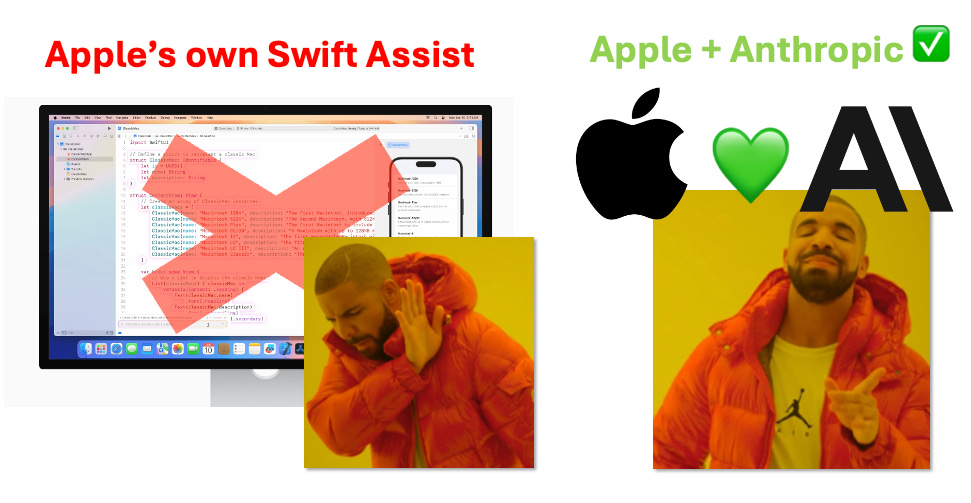
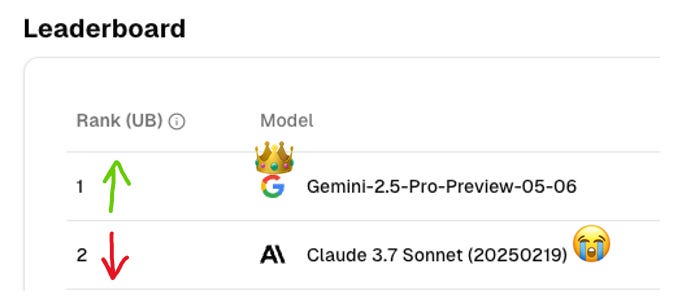
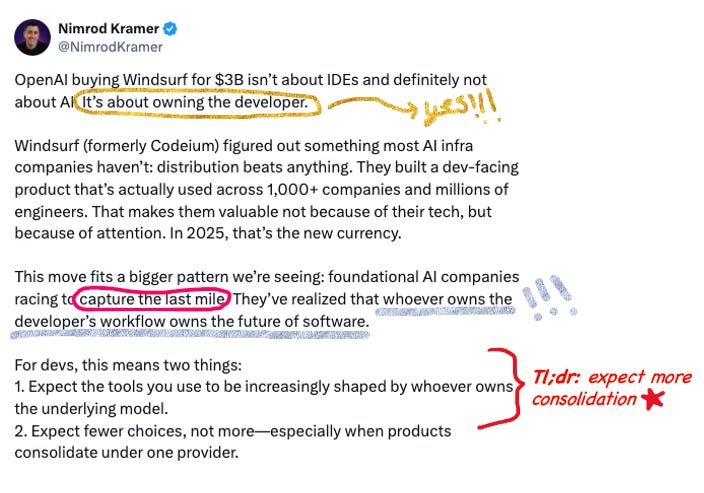
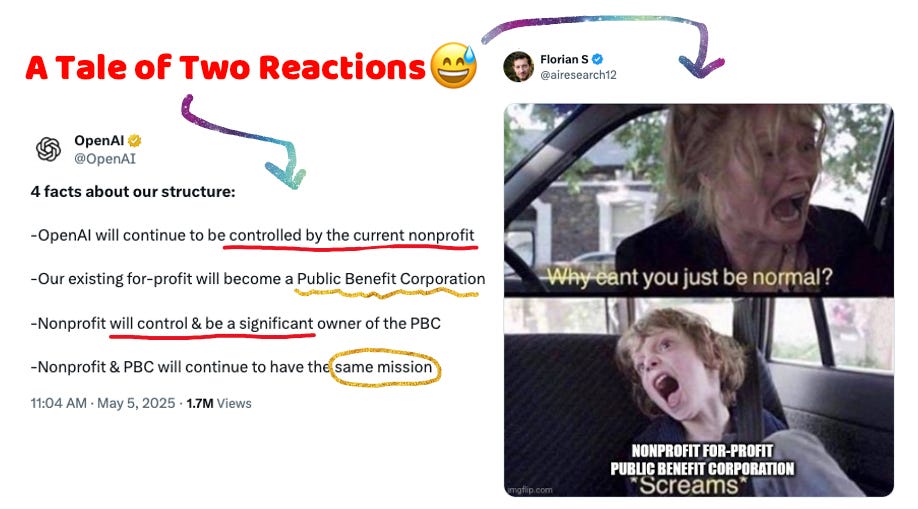
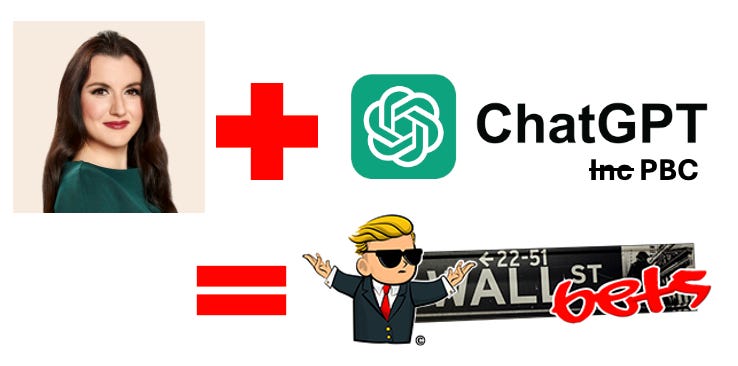

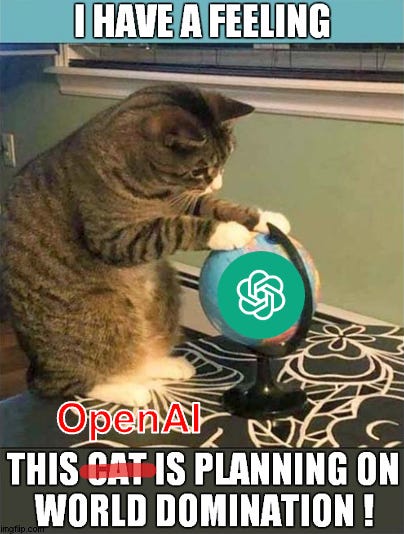
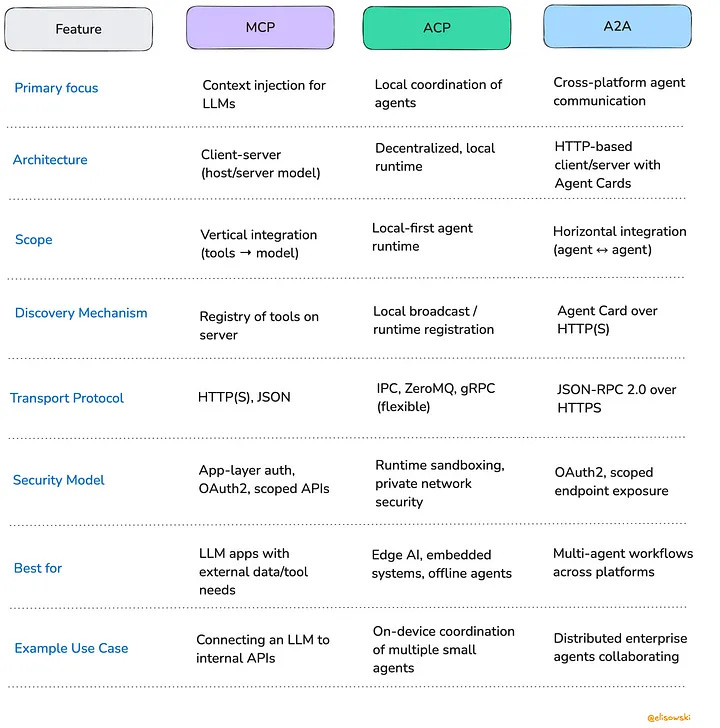
Great list